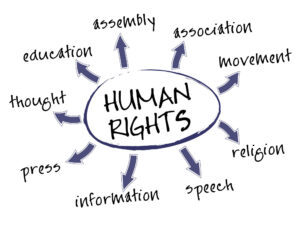Back to: Pre Vocational Studies JSS 1
Welcome to class!
In today’s class, we’re going to be talking about sexually transmitted infections and HIV/AIDS. I trust you will enjoy the class!
Introduction
Human rights are basic rights and freedoms that belong to every person, regardless of nationality, race, religion, gender, language, or any other status. These rights are essential for human dignity and well-being. Children, as the most vulnerable members of society, have special rights that protect their interests and ensure their healthy development.
Fundamental Human Rights

- Right to Life: Every person has the right to life, liberty, and security of person. This includes the right to be free from violence, torture, and arbitrary deprivation of life.
- Right to Equality: Everyone is entitled to equal treatment before the law and the right to equal protection against any discrimination. This includes discrimination based on race, color, sex, religion, political opinion, national or social origin, property, birth, or other status.
- Right to Freedom: Everyone has the right to freedom of opinion and expression, including the freedom to hold opinions without interference and to seek, receive, and impart information and ideas through any media and regardless of frontiers. This also includes the right to freedom of thought, conscience, and religion.
- Right to Education: Everyone has the right to education. This includes primary education, which is compulsory and free. Secondary education should be accessible to all and higher education should be equally accessible to all on the basis of merit.
- Right to Work: Everyone has the right to work, to free choice of employment, to just and favorable conditions of work, and to protection against unemployment.
- Right to Adequate Standard of Living: Everyone has the right to an adequate standard of living for himself and his family, including food, clothing, housing, and medical care and necessary social services.
- Right to Health: Everyone has the right to the highest attainable standard of physical and mental health. This includes the right to medical care and the right to be free from diseases.
- Right to Social Security: Everyone has the right to social security and is entitled to realization of economic, social, and cultural rights indispensable for his dignity and the free development of his personality.
- Right to Family: Everyone has the right to a family.
- Right to Play: Children have the right to play and recreation.
Rights of the Child

The Rights of the Child are a set of international standards that protect the rights of children. These rights are enshrined in the Convention on the Rights of the Child, which has been ratified by almost every country in the world.
- Right to Survival and Development: Children have the right to survival and development. This includes the right to be alive, to grow, and to develop to their full potential.
- Right to Protection: Children have the right to be protected from all forms of violence, abuse, neglect, and exploitation. This includes the right to be protected from child labor, trafficking, and sexual abuse.
- Right to Participation: Children have the right to participate in decisions that affect their lives. This includes the right to express their views and to have their views taken into consideration.
Examples of Violations of Children’s Rights
- Child labor: Children working in hazardous conditions, such as factories or mines.
- Child trafficking: Children being sold or forced into labor or prostitution.
- Child marriage: Children being forced into marriage at a young age.
- Denial of education: Children being denied access to education.
- Abuse and neglect: Children being physically, emotionally, or sexually abused or neglected.
Summary
Fundamental human rights and the rights of the child are essential for the well-being of all individuals, especially children. It is the responsibility of governments, families, and communities to protect and promote these rights. By understanding and upholding these rights, we can create a more just and equitable world for all.
Relevant Examples
- Child labor: Children working in hazardous conditions, such as factories or mines.
- Child trafficking: Children being sold or forced into labor or prostitution.
- Child marriage: Children being forced into marriage at a young age.
- Denial of education: Children being denied access to education.
- Abuse and neglect: Children being physically, emotionally, or sexually abused or neglected.
Additional Notes
- The rights of the child are interconnected and interdependent.
- Governments have a responsibility to ensure that children’s rights are protected and promoted.
- Families and communities also play a crucial role in protecting and promoting children’s rights.
- Children should be empowered to exercise their rights and participate in decisions that affect their lives.
By delving deeper into these topics, you can gain a better understanding of the importance of human rights and the rights of the child, and the steps that can be taken to protect and promote them.
Evaluations
- What is the right to life, liberty, and security of person?
- What is the right to equality?
- What is the right to education?
- What are the rights of children in Nigeria?
- How can we promote the rights of the child?
We have come to the end of today’s class. I hope you enjoyed the class!
In the next class, we shall be discussing Fundamental Human Rights a the Child.
In case you require further assistance or have any questions, feel free to ask in the comment section below, and trust us to respond as soon as possible. See you in the next class!
